Biotech Crops Continue to Benefit Smallholder Farmers in Developing Countries; More Products in the Pipeline for the Philippines
| |
The Philippines is celebrating the 17th National Biotechnology Week (NBW) this week, November 22-26, 2021. This feature from ISAAA first appeared in BioLife magazine, distributed during the NBW2021.
By 2050, the world population is expected to increase to nearly 10 billion people from today’s 8 billion. As that time approaches, every farmer faces the challenge of increasing productivity to meet rising food demands while coping with climate change, pests and diseases, and other environmental stresses such as drought and salinity. One of the tools available to farmers is biotechnology. Biotech crops, since their first year of commercial planting in 1996, have remarkably produced higher yields using fewer inputs than conventional varieties. The recent report published by the International Service for the Acquisition of Agri-biotech Applications (ISAAA) reveals that in 2019, farmers in developing countries continued to adopt and benefit from the technology.
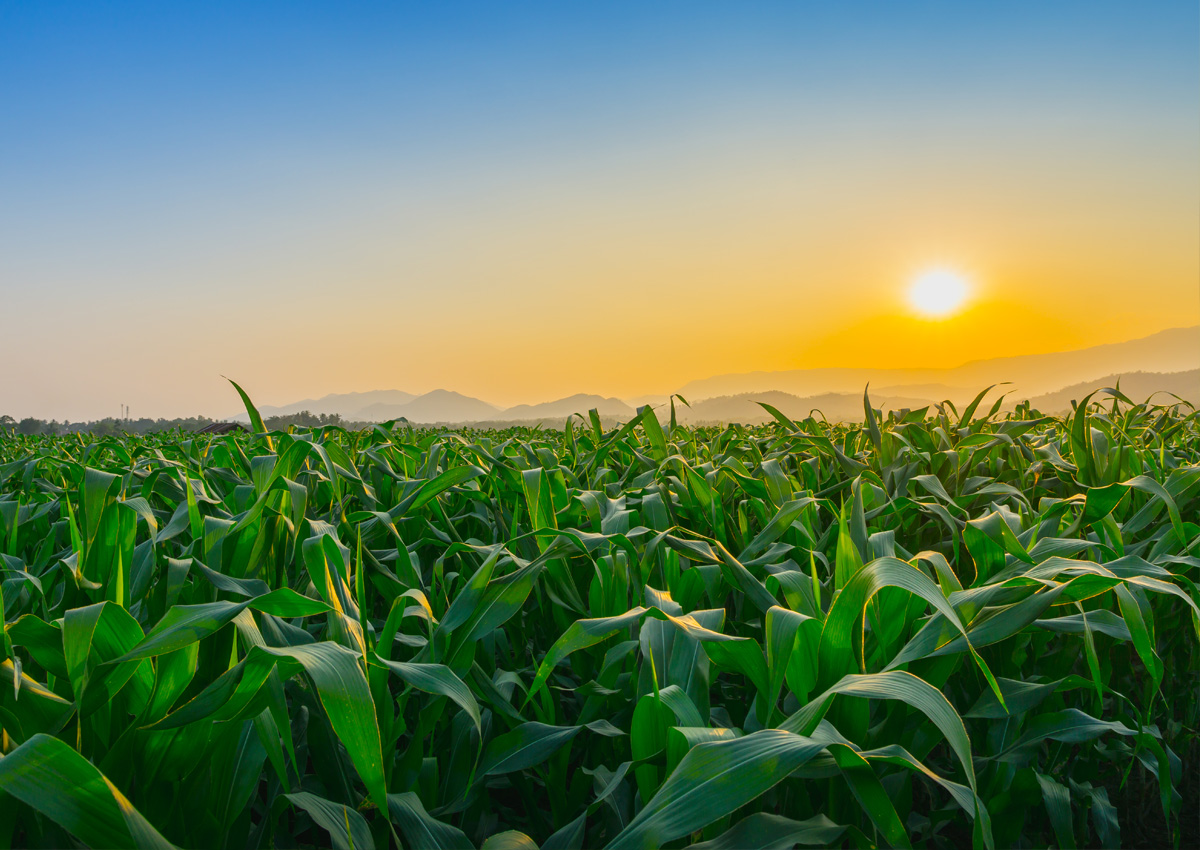
In 2019, 29 countries planted a total of 190.4 million hectares of biotech crops. (Photo Source: iStockPhotos.com)
Global status of biotech crops
In 2019, the 24th year of commercialization of biotech crops, adoption was recorded for a total of 72 countries. Of this number, 29 countries planted and an additional 43 imported biotech crops for food, feed, and processing. A total of 190.4 million hectares of biotech crops were grown by 29 countries—24 developing and 5 industrial. Fifty-six percent of the global biotech crop area was grown in developing countries, while industrial countries planted the remaining 44 percent. For the last 24 years of commercialization (1996-2019), a total of 2.7 billion hectares of biotech crops were planted by almost 30 countries across six continents.
The top five biotech crop-growing countries—the USA, Brazil, Argentina, Canada, and India—grew 90 percent of the total biotech crop area in 2019. Biotech crop adoption in these countries reached close to saturation. The major biotech crops planted and adopted by the 29 countries include soybeans, maize, cotton, and canola. Based on the global crop area for these crops, 79% of cotton, 74% of soybeans, 31% of maize, and 27% of canola were biotech crops in 2019.
In recent years, more biotech crops were developed beyond the major four crops to offer choices for many of the world’s consumers and food producers. These crops include alfalfa, sugar beets, sugarcane, papaya, safflower, potatoes, eggplant, squash, apples, and pineapple.
Biotech crops in Asia
In 2019, nine countries in Asia and the Pacific planted six biotech crops, including cotton, maize, canola, safflower, brinjal (eggplant), and sugarcane. Three countries, India, Pakistan, and China, planted more than 1 million hectares of biotech cotton and they were among the top 10 biotech crop-growing countries. Six more countries planted less than 1 million hectares of various biotech crops, including the Philippines (biotech maize), Australia (biotech cotton, canola, and safflower), Myanmar (biotech cotton), Vietnam (biotech maize), Bangladesh (biotech brinjal/eggplant), and Indonesia (biotech sugarcane).
Biotech crops in the Philippines
Biotech maize has been commercially grown in the Philippines for nearly two decades. The Philippines was the first country in Southeast Asia to plant Bt maize in 2003 and has become a model for science-based and thorough regulatory policy in the region since then. For years, the Philippines remained the only country in the region planting biotech maize, benefiting smallholder farmers, their families, and communities.
Biotech maize is the only biotech crop commercialized in the Philippines. In 2019, the Philippines ranked 12th among the 29 countries in the world that planted biotech crops. The total area of biotech maize in the country increased to 875,000 hectares, a double-digit growth rate of 39% equivalent to 245,000 hectares from the previous year’s planted area. The adoption rate of biotech maize also increased to 62% in 2019 compared to 50% in 2018. Such increases were recorded following good global prices and increasing feed demands for local consumption.
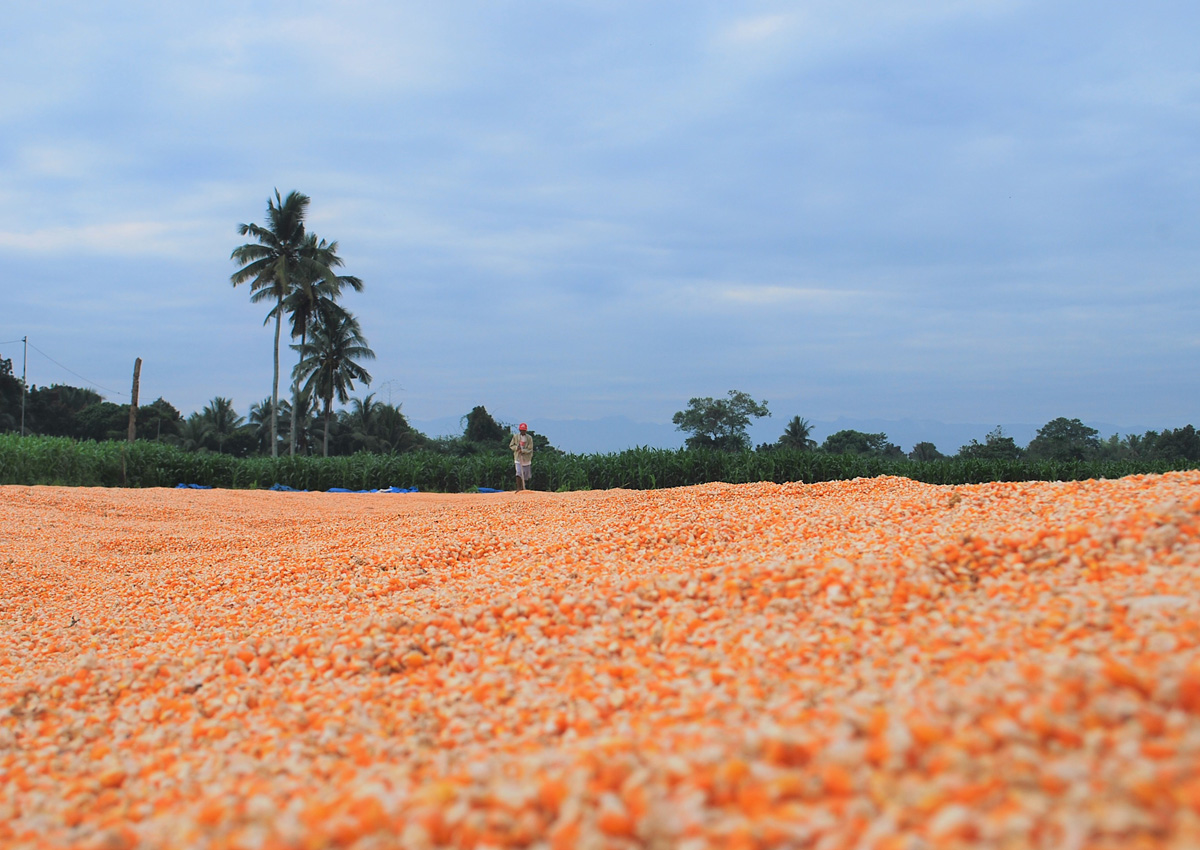
Harvested maize harvest is drying in a field in General Santos City, one of the top maize-producing provinces in the Philippines. (Photo Souce: ISAAA)
The farm-level economic benefit of planting biotech maize in the Philippines from 2003 to 2018 was estimated to have reached US$872.6 million. For 2018 alone, the net national impact of biotech maize on farm income was estimated at US$87.7 million, according to a 2020 study conducted by economists Graham Brookes and Peter Barfoot. These immense economic gains are continuously benefiting more than 673,000 smallholder farmers (with an average of 1.3 hectares farm size) and their families and communities in the last 16 years of biotech maize commercialization in the Philippines.
Since 2002, the Philippines has approved a total of 60 biotech maize events for commercial planting and granted a total of 244 approvals for food, feed, and cultivation for 120 events for eight biotech crops.
New biotech crop products are being developed by national and international institutions in the Philippines. The fruit and shoot borer resistant Bt eggplant being developed by the Institute of Plant Breeding of the University of the Philippines Los Baños (IPB-UPLB), was a royalty-free technology donated by the Maharashtra Hybrid Seed Company (Mahyco) through a sublicense agreement. Field trials of promising hybrid varieties have been completed in 2012, and the Bt Eggplant Project team has published results from these field trials which showed the high trait efficacy of the Bt technology with no adverse effect on non-target organisms. The team is working with experts in preparing a regulatory package for cultivation and IRM plan for submission according to the new set of regulatory guidelines under the Joint Department Circular Series 1 (2016).
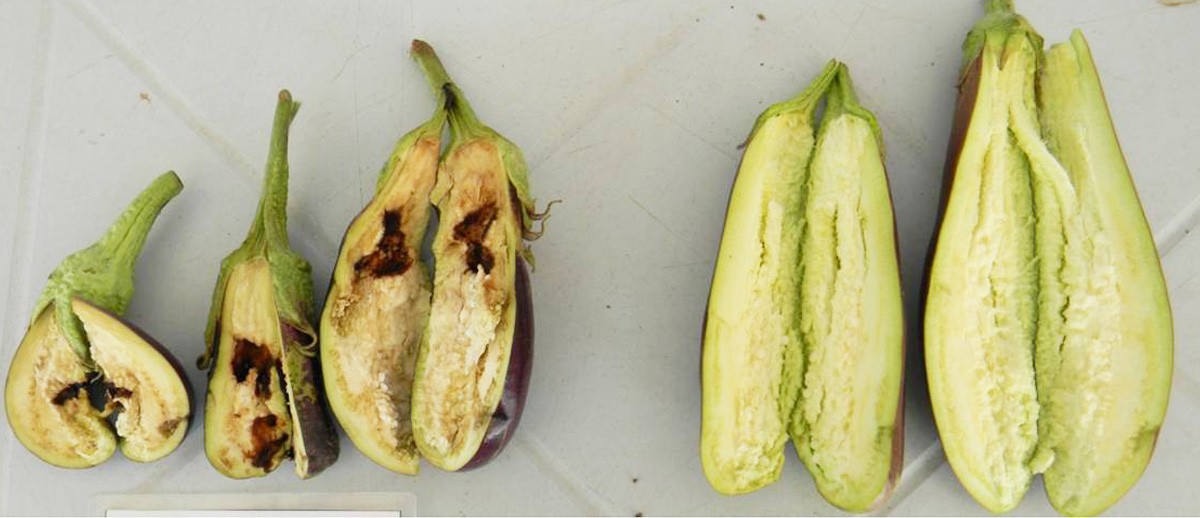
Non-Bt eggplant (left) and Bt eggplant (right). (Photo Source: UPLB Bt Eggplant Project)
Golden Rice or GR2E rice is biotech rice biofortified with pro-vitamin A (beta carotene). It is being developed by the Philippine Rice Research Institute (PhilRice) and the International Rice Research Institute (IRRI). Two seasons of confined field testing of Golden Rice have been completed in early 2016 under the strict monitoring of prescribed government bodies. In February 2018, Food Standards Australia and New Zealand (FSANZ) determined that there are no public health or safety concerns for GR2E Golden Rice. Health Canada also released a positive assessment for Golden Rice in March 2018, followed by a similar declaration from the US Food and Drug Administration (FDA) in May 2018. In December 2019, the Philippines' Department of Agriculture-Bureau of Plant Industry (DA-BPI) issued a biosafety permit for GR2E Golden Rice for direct use as food and feed, or for processing (FFP), saying that after a rigorous biosafety assessment, DA-BPI has found Golden Rice "to be as safe as conventional rice." In early 2021, PhilRice and IRRI have applied for the commercial propagation of GR2E rice in the Philippines.
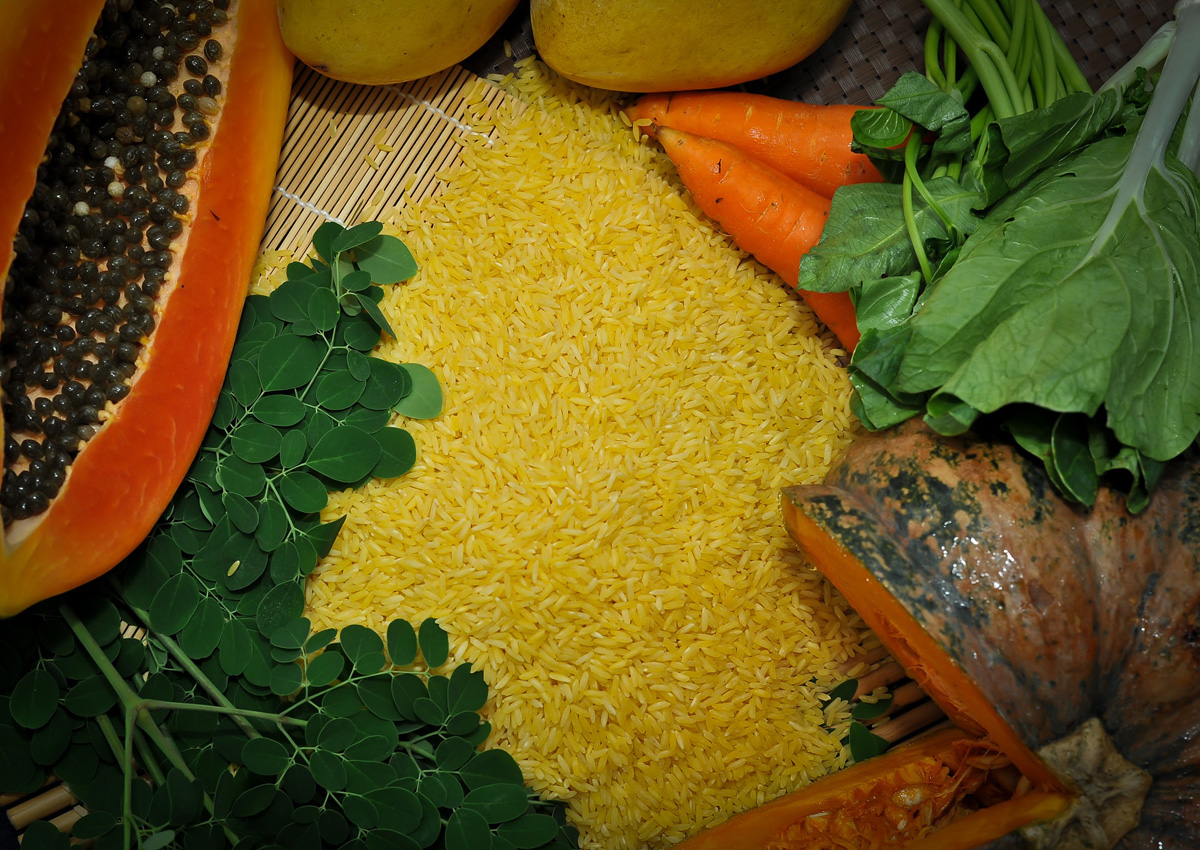
Golden Rice with beta-carotene-rice foods. (Photo Source: IRRI)
Biotech papaya with delayed ripening and papaya ringspot virus (PRSV) resistance traits is also being developed by IPB-UPLB. It has undergone a contained test in 2012 and a confined field trial in 2014. In 2017, the technical advisory team of the Department of Agriculture Biotech Program Office recommended a second field trial. The dossiers are currently being prepared for the contained trial and its eventual varietal registration.
Bt cotton is being developed by the Philippine Fiber Industry Development Authority (PhilFIDA). The technology, provided by Nath Biogene Ltd. and the Global Transgene Ltd. from India was tested for the first time in a confined field trial in 2010, and multi-location field trials in 2012 and 2013. In 2015, the data to complete the required regulator dossiers were obtained, as well as some related laboratory experiments in 2017. The evaluation further confirmed the bioefficacy of the Bt cotton hybrids against the cotton bollworm. The proponents will apply for the commercial propagation as soon as the certificate of satisfactory completion of the multi-location field trial is received.
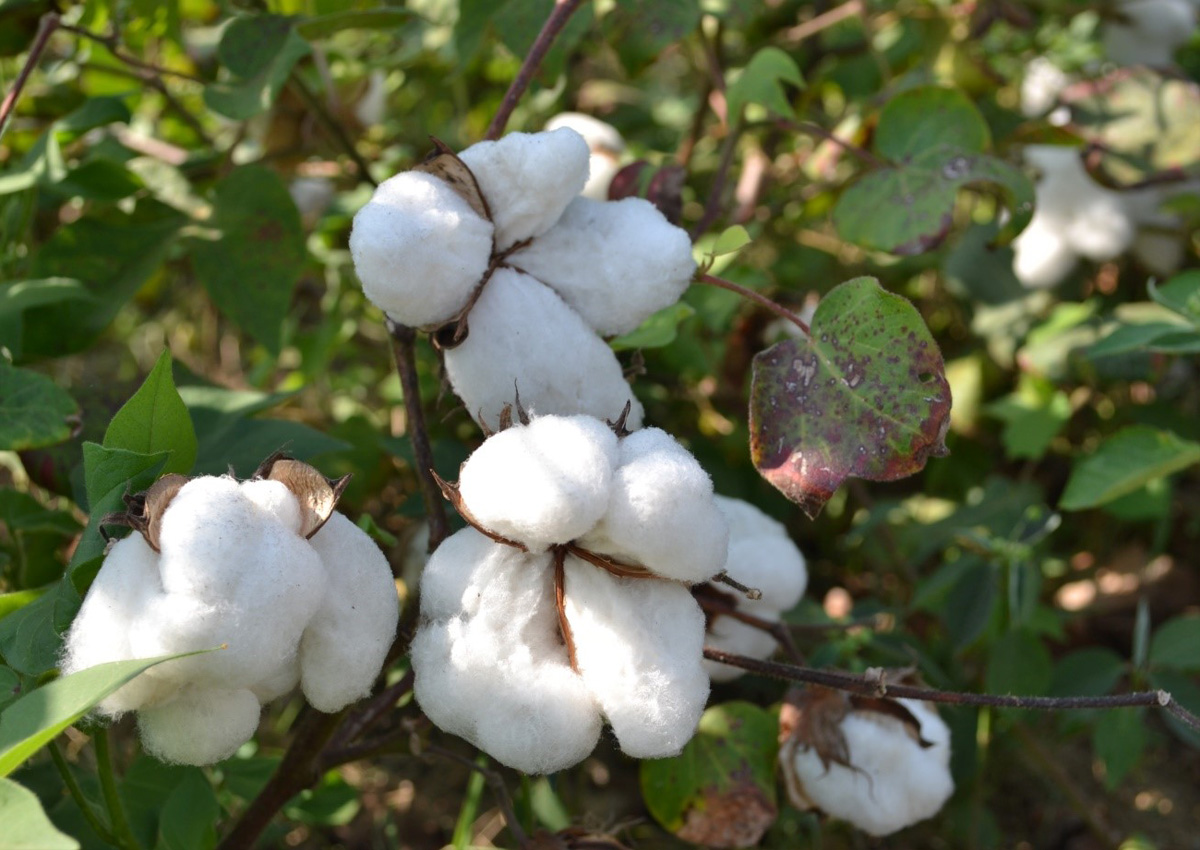
Insect resistant Bt cotton. (Photo Source: Philippine Fiber Industry Development Authority)
Conclusion
Biotechnology offers immense potential to help Filipino farmers grow more crops on less land and fewer inputs using environmentally sustainable farming practices. Speedy approvals of new biotech crops and traits through a prompt and transparent regulatory process is greatly needed so farmers in the country can optimize the benefits of the technology, and help in increasing sustainable food production, mitigate climate change-associated problems of drought and salinity, submergence, and the emergence of new pests and diseases such as the fall armyworm.
From 1996 to 2018, biotech crops have contributed significantly to global food security, sustainability, and climate change solutions by increasing productivity, conserving biodiversity, providing a better environment, reducing CO2 emissions, and helping alleviate poverty and hunger by uplifting the economic situation of up to 17 million farmers and their families, totaling more than 65 million people.
Sources:
- ISAAA. 2019. Global Status of Commercialized Biotech/GM Crops in 2019. ISAAA Brief No. 55. (https://bit.ly/ISAAABrief55)
- Brookes, G. 2020. GM Crops: Global Socio-Economic and Environmental Impacts 1996-2018. (http://bit.ly/PGEcon2018)
| Newer Post | Archive | Older Post |
Science Speaks is ISAAA Inc.'s official blog. Weekly blog articles, authored by ISAAA writers, partners, and invited contributors, aim to help share, disseminate, and promote scientific knowledge and its vital role in achieving global agricultural sustainability and development. Your support to Science Speaks will help us achieve this goal. You can help us by donating as little as $10.

